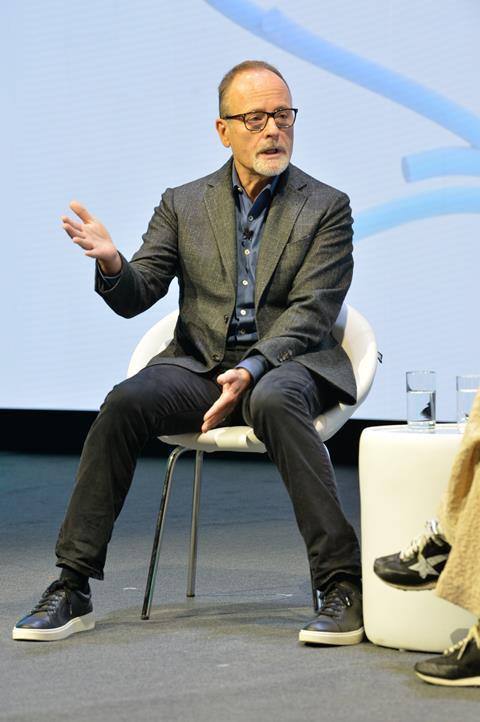Veteran exec and ‘Mayor of TV’ eschews attention obsession for ‘culture economy’
FX chair John Landgraf is looking to double-down on the “culture economy” rather than the “attention economy”, despite viewing continuing to flow to YouTube.
Landgraf and his team’s recent output ranges from The Bear and Shōgun to Aliens: Earth, and the veteran exec told the RTS Cambridge Convention this morning that avoiding a rush to quantity over quality was key to his strategy.
Landgraf pointed to Nielsen’s most recent findings in the US, which revealed that YouTube now has a 13% share of all large TV’s, with Disney at number two.
But he said it remained vital for studios like his to focus on producing long-form content aimed to wholly engage viewers.

“Ultimately, I want to make something that is worthy of people putting their phones down to, and better yet, something that they want to watch with someone else they care about,” he said.
“Look at Disney – the most expensive thing consumers do with their time is go to a theme park, or they go to sports. Why do they do that? It’s because the quality of what they get from their attention in that environment is worth it.
“Now, we’re not live sports but we have to be as close to that as possible. If you compete on volume you will simply lose.”
Landgraf saw huge success with Emmy-winning Shōgun last year - which took a decade to get onto screen and cost north of $200m (~£145m) – but he highlighted the inherent tension between the quarterly results of US firms and the longer-term cycle of scripted production.
“In the attention economy, it doesn’t matter what is put forth, it just matters if it gets attention. We’re at the opposite end of the spectrum,” he said.
“We have to invest time and challenge people with creating shows that can endure, but that is very difficult when your business imperative is today, tomorrow, the next quarter.”
Landgraf admitted to being “terrified” last year on the eve of the launch of Shōgun, which was English and Japanese language, but said its long-form nature and its “epic” roots – something he had found “under the bonnet” of Game of Throne – had reassured him that there would be a market.
“Shōgun is an epic and there is an audience that love those shows, and I thought if we could get people engaged then they’d like it.
“There is still an appetite for long-form storytelling. On the eve of launching Shōgun I thought ‘well, here’s a test for that’. But there was a market for it,” he said, adding that the show’s long tail views are continuing to grow. “If we build it, they will come.”
During the far-reaching discussion with Sister’s Jane Featherstone, Landgraf also admitted that it is “challenging” making shows given the current cost of production and explained how FX’s presence on Disney+ had changed his strategy.
“There’s the challenge of making shows that penetrate a global audience and reach a significant part of Disney+’s 140m subscribers,” he said, adding that it was “exciting to have such a large canvas”.

“Alien: Earth was the rare circumstance of first having access to corporate IP and that show, and Shōgun, will have more consumption outside the US than inside - that’s a new thing,” he said.
“I need a few shows on the slate for the benefit of our colleagues in Asia, Europe and Lat Am, but then I always want something like The Bear that can work in the US vernacular and travel.
“And then I also know that I’ll make some shows that won’t travel.”
Consolidation is inevitable, the FX boss added, because “we can’t have so many global streamers and some of the legacy majors just don’t have enough scale”.
Landgraf expects the trio of Paramount, NBCUniversal and Warner Bros Discovery to consolidate into two companies to “have enough scale to compete globally”.
The exec added that FX is looking to expand its spending outside the US, pointing to the recent hire of former ITV exec Angela Jain as one strategy to compete with Netflix.
“We have challenges, but we are now focusing on local with Angela… and I’m spending money domestically and repositioning as much capital as I can outside the US because Netflix is frankly quite advanced,” he said, with Landgraf agreeing with Featherstone’s comment that Netflix is several years ahead on its global strategy.
“Consolidation must happen, but it will be really hard for creative community. If you look at the balance sheets [that US majors] have now and the need to scale to 250-300m subs, then there’s not a way to do that without consolidation.”
Landgraf, who has been in the role for more than two decades, also said there was a common thread in FX shows from his early years – such as The Shield and Rescue Me – and those he’s working on today.
“The shows have changed, but in some ways they’re still the same because it comes down to the human condition [which] they represent. That focus gives me incredible latitude.
“Shortform content on the internet doesn’t have a lot of sub-text. But the best storytelling has layer upon layer of meaning, and writers, actors, producers can bring those great resonant moments. That’s what we’re looking for.”









No comments yet